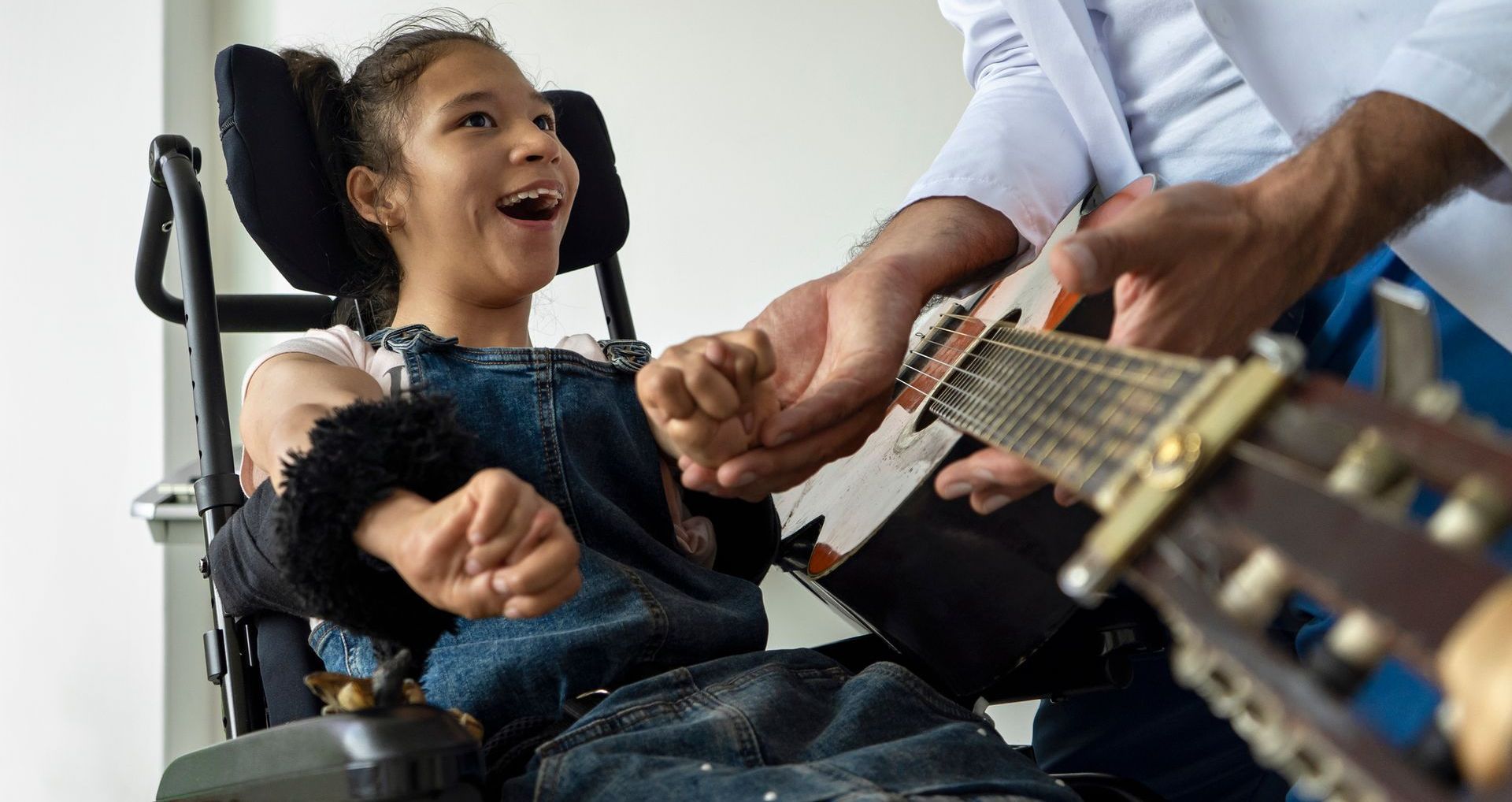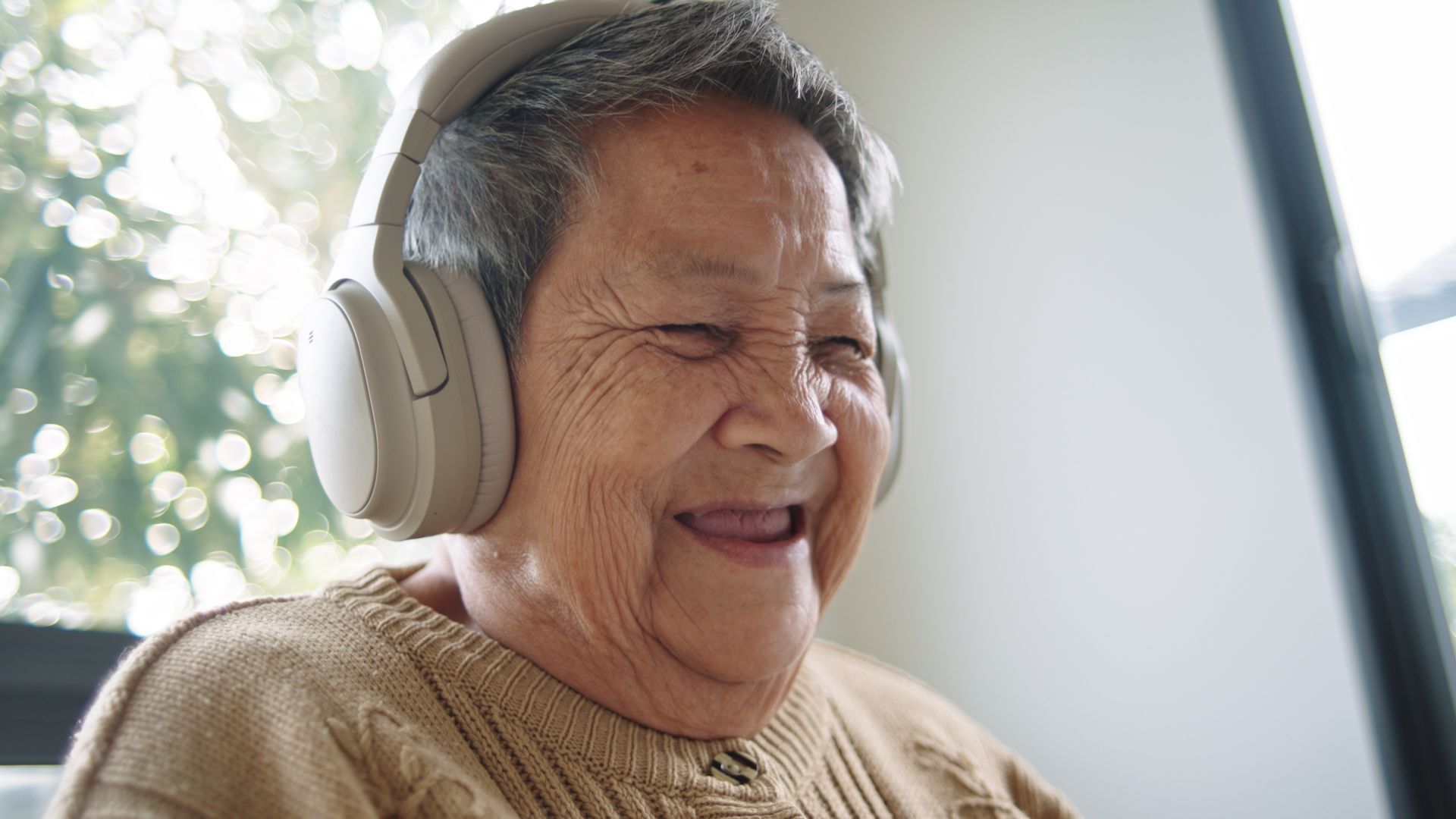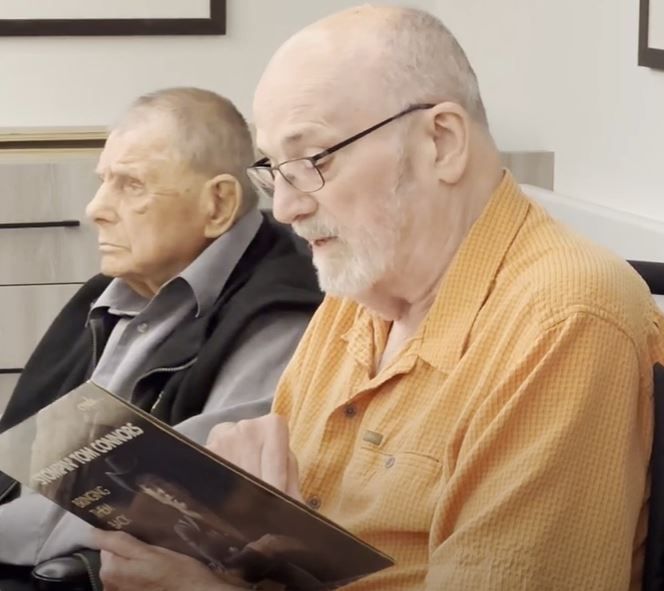Long-term Care
MUSIC CARE WEBINARS
Blogs

Music is a catalyst for measurable change . And it can be woven into the fabric of a caring community. Care leaders have the power to make that change a reality within their organization through our MUSIC CARE CERTIFY program. Kindera Living has rolled out MUSIC CARE CERTIFY in 8 of their homes in Ontario with excellent results. Each care centre had their own unique music care site team and addressed a site challenge with music. For example, Kindera’s Dundurn Place Care Centre wanted to reduce the stress of daily care given to residents. Dundurn is in the heart of downtown Hamilton; it is multicultural, and serves 112 long-term care residents, 2 respite and 22 convalescent residents. The music care site team learned the residents’ musical preference and incorporated them into personalized playlist used during personal care sessions by the PSWs. Expressive behaviours were reduced by 78%. Cooperation during care improved and stress was reduced for both the care recipient and care giver. At Wellington Park Care Centre in downtown Burlington with 135 long-term care beds and a 16-bed restore program, the music care site team wanted to improve resident experience by creating a music-rich environment. By offering an abundance of new music programs, adding music to existing programs, and encouraging opportunities for musicking, Kindera’s Wellington Park increased monthly musical offerings by 128%. This meant music therapy hours were doubled and now, all residents have their own set of headphones. The team saw an increase in engagement, emotional responses and social interaction. At Banwell Gardens Care Centre in Windsor, a 142-bed Kindera home, the music care site team evaluated the impact of a resident chosen song on staff, when played during the honour guard. Note, when the residents dies and leaves the home through the front door, staff, residents and family gather for an honour guard. Results showed that 83% of staff feel less isolated in their grief when this ritual is performed with resident-chosen music; 94% of staff felt that the resident-chosen honour guard song helps them process grief more effectively. At Anson Place Care Centre, a 47-bed Kindera home in Hagersville, the music care site team created the ‘Sound Bites’ initiative where resident personalized playlists enhanced the dining experience and increased resident appetite by 19%. There were other benefits during mealtime as well, such as a 20% increase in social interaction with more talking, humming, singing, laughing, smiling, swaying and toe tapping. Huron Hospice in Goderich Ontario was the first hospice in Canada to become MUSIC CARE Certified. Their music care site team wanted bedside musicians and nurses at their residential hospice to observe and evaluate the effects of music on residents. By developing two observational feedback cards to record observational outcomes, hospice nurses found that 83% of residents felt calmer from live music moments offered by trained community musicians. Not only did the residents benefit from the music, there was deeper mutual appreciation and support amongst the nursing staff and volunteer musicians. Acclaim Health in the Peel and Halton regions offer adult day programs to support physical and mental well-being through independent living, reduced social isolation and innovative dementia care. At Patty’s Place and Mississauga Clubs, the music care site team used cue songs to improve client transitions in afternoon programming. By using a catchy familiar tune to encourage clients to get up and walk to the after-lunch programming, 75% of clients showed more engagement during the transition by singing, clapping or dancing. At the Burlington and Walmley clubs, personalized musical playlists were used to redirect client agitated focus towards musical engagement such as listening, singing, dancing and discussing. While these are some of the measurable changes reported through the MUSIC CARE CERTIFY process, anecdotal evidence of music’s impact was plentiful. “The stories that come out of our Men’s Musicking program are often touching and humourous which opens the door for deep emotional reminiscence and a collective appreciation of each other’s lives.” – Music care site team member, Menno Place, Abbotsford, BC “Lack of quality sleep in seniors can lead to a range of issues, including increased risk of chronic diseases like heart disease, stroke and diabetes, as well as cognitive decline, falls, weakened immune systems and mental health problems like depression and anxiety. Hawthorne Care Centre’s music care team along with PSWs, used music (15 minutes of play) prior to bedtime to improve resident sleep quality. How exciting for Hawthorne residents!” – Sandy Croley, Director of Programs and Rehabilitation, Kindera Living “Before music was introduced, he was constantly in his room and preferred to stay in bed and sleep. After Arbour Beats came in play, I noticed him coming out of his room much more often asking what programs were happening. I now notice he will start singing in his room on his own, even when music is not playing. He sits in his chair and belts out multiple songs at any time of day for a long duration. I think music sparked something in him.” – Music care site team member, Arbour Creek Care Centre, Stoney Creek, ON We honour all of the early adopters of MUSIC CARE CERTIFY , building the case for music integration as a strategic, key change in the care culture.

In the first two blogs of this Key Change series, we looked at why music is considered a care solution. Undoubtedly, there is still a lot of work to do in educating the public and the care sector with a clear rationale for musical care. The bigger question, though, isn’t why music, it is how music can become integrated into the daily practice of caregivers and caring communities in a way that is meaningful, sustainable, and measurable. Many caring communities struggle to operationalize approaches like music care in a way that’s both intentional and measurable. While the research supports music’s therapeutic benefits, there’s often a disconnect between evidence and practice. The real question is how do we move from theory to everyday application? Room 217’s Integrated Model of Music Care (IMMC) is a proven framework designed to embed music into the daily practices of caregivers and care organizations. This model not only addresses cultural and contextual differences but also optimizes music in any health or social care setting. The IMMC ensures that music is not simply an add-on or an afterthought but an integral part of a care delivery system. By considering the specific needs and operational realities of an organization, this framework encourages implementation of purposeful music and sound based interventions—such as personalized playlists, music therapy, soundscapes, or community performances—tailored to improve the physical, emotional, and social well-being of everyone in the circle of care. The IMMC framework is grounded in four key components, beginning with education. Informed music use begins by training a team at the care site to champion the music care approach. With this knowledge, the team identifies a clear intention for using music to make an impact, such as reducing isolation for residents by introducing music initiatives and interventions. These can include initiatives (like a bell choir or personalized playlist) or interventions (evidence-based practices, such as those provided by a neurologic music therapist.) These initiatives are implemented through measurable programs, care tasks, or therapeutic relationships, with changes tracked through both process and outcome evaluations. Music care integration is achieved when music becomes an essential, recognized component of the care process, with all caregivers using it intentionally to address challenges in the care environment.

Health and social care leaders are tasked with making critical decisions that impact the wellbeing of both care recipients and staff. Since the COVID pandemic, we have all come to appreciate the complex challenges of providing quality care in long-term care (LTC) environments—challenges that often seem insurmountable, despite efforts to allocate resources effectively. A few years ago, I had a conversation with a newly appointed administrator in a long-term care home who asked me, "What’s so special about music?" It was a fair question. She was new to the sector, and with so many competing demands on her time and budget, she was understandably cautious about where to invest. That day, I gave her several compelling reasons why music should be a priority: it’s cost-effective, non-pharmacological, easily accessible, and most importantly, it’s part of the human experience. If I were to meet with that administrator again today, I’d focus on one key issue that’s at the heart of many care challenges: poor quality of life (QoL) for residents in long-term care, and how music care is a solution that can turn this around and quickly. Here’s why music care integration to address QoL is the investment every care leader needs to prioritize: Tangible Person-Centred Care Funding models often prioritize medical solutions over quality of life interventions, leading to institutionalized care recipients being treated as pathologies instead of people. Music, however, is an affordable, non-invasive, and customizable tool that can enrich the QoL for individuals at any stage of life. By purposefully designed music care programming, the focus can be shifted from just managing illness to fostering meaningful, person-centered care that enhances well-being. 2. Staffing and Retention The stress and burnout that care staff face is undeniable. Overworked and under-resourced teams struggle to meet the needs of care recipients, leading to high turnover and poor morale. Music care programs, which include self-care strategies for staff, create a calmer, more peaceful environment that can help reduce stress, improve job satisfaction, and bolster retention. Supporting staff resilience is essential in ensuring quality care for both residents and the workforce. Safety Safety concerns—whether physical, psychological, or environmental—are at the core of every caring community. Music care can enhance safety by reducing falls, especially during high-risk times like shift changes. Music also promotes cooperation and calm during caregiving tasks, helping care recipients feel more at ease. By incorporating mindful sound management into the environment, music helps create a safer, more comfortable space for all. Complex Care Needs Particularly in LTC, care recipients often face complex, multifaceted challenges—loneliness, pain, depression, anxiety, and behavioral issues. Music care offers a non-pharmacological, therapeutic intervention that addresses these needs without relying on medications or emergency room visits. By integrating music care into daily routines, the need for antipsychotics is reduced creating a more holistic approach to care. Operational Framework One of the biggest obstacles to music care integration is the lack of a structured framework. Without clear guidelines, standards, or expectations, music care often remains an afterthought. That’s why an evidence-based model, such as Room 217’s MUSIC CARE CERTIFY program, is critical. It promotes measurable outcomes, establishes the role of professional music care practitioners, and ensures that music care is sustainable and scalable across LTC organizations. Awareness and Advocacy While some care providers are beginning to recognize the benefits of music as a therapeutic modality, widespread public awareness and funding remain limited. Advocacy is needed by supporting music care education and public awareness campaigns. In this way, the evidence of music’s efficacy and especially for QoL, is brought to the forefront, making a compelling case for change that resonates with the LTC community and its decision-makers. Training for Healthcare Practitioners There’s currently no mandatory music care training for health and social care practitioners. While many professionals, including nurses, social workers, and recreation therapists, intuitively use music in their practice, they may not always have the tools or training to do so effectively. Providing music care skills training equips LTC staff with the confidence and knowledge to integrate music strategies responsibly and with purpose and to use it to boost their own self-care. In every meeting I have today with LTC administrators—whether they’re in suits or sweaters—I make it clear that musical care is a viable solution for ensuring good quality of life for everyone. With the right framework, education, and investment, music can be a transformative, scalable solution that impacts everyone in the circle of care.

A growing concern among both recreational and clinical staff in long-term care (LTC) is the health and wellness of men in care. Health professionals have long recognized that men, both in and out of care, tend to experience lower overall health profiles compared to women. RESEARCH widely acknowledges that sex and gender intersect with factors like race, ethnicity, socioeconomic status, disability, and age to shape individual health outcomes. Notably, men face unique challenges when it comes to health and wellness. Globally, men are outlived by women in all settings, a phenomenon known as the male– –female health-survival paradox The Male-Female Health-Mortality Paradox | SpringerLink . This disparity highlights the need for gender-specific approaches to healthcare, as men’s health is increasingly recognized as a public health concern. Researchers and policymakers are working to understand the roots of these inequalities, with many pointing to social norms and behaviors formed in adolescence. We are familiar with stereotypes about men engaging in higher-risk activities, from motorcycle riding to nicotine addiction. However, one of the most significant factors affecting men’s health and longevity is their tendency to have fewer and less robust social connections compared to women. Women generally participate in social forums where they express emotions more freely, while men, historically, have been less likely to depend on social groups or engage in regular emotional expression. This can lead to isolation, which negatively impacts both mental and physical health. One promising approach to addressing social isolation among men is through men’s musicking. Music has always provided a way for men to come together—whether through singing, playing instruments, or participating in music listening groups. From male choirs like the Maesteg Choir in Scotland, to garage bands playing for the sheer joy of it, music offers a safe, non-threatening environment for men to gather, share memories, and express emotions, even if only subtly. Our September webinar presenter and partner, Gertrude Letourneau, shared a powerful story from her work in a long-term care home. One resident, a veteran, asked for permission to sing in his home language, which happened to be German. Being deeply sensitive to the other veterans he lived with, he began to sing which prompted an incredible emotional release of grief, tears, regret, reflection and sorrow. Menno Place, a recent graduate of our CERTIFY for ORGANIZATION program, discovered through their own research that hosting a vinyl record listening hour provided a powerful way to engage self-isolating men. This nostalgic activity brought men out of their rooms and into a safe, non-judgmental space where they could share memories, relive the joy of past entertainers, and reflect on times gone by. The program bridged generational gaps, allowing them to swap stories with the younger caregivers. Linda Weatherly, Manager of Therapeutic Recreation and Volunteer Services at Menno Place in Abbotsford, British Columbia, recalled that some conversations became quite lively, even veering into “racy” territory at times. However, this openness was precisely what was needed—creating a space where the men felt comfortable being themselves and expressing what they needed to. The program, known as Men’s Musicking, became much more than a listening hour. It was a catalyst for cognitive stimulation, sparking memories and conversations that promoted social interaction and emotional expression. The long-term effects of this initiative remain to be seen, but for now, we can applaud the creative and innovative leadership of people like Linda, who are using music to address some of the most pressing concerns in healthcare today.

The impact of COVID in care settings, specifically Long-Term Care, has been monumental with social programming being set aside for safety protocols and PPE. Although the movement to a more medical model of care makes sense from a safety lens, we are now realizing the devastating effect this has had on residents as they express helplessness, loneliness, isolation, and boredom. In December 2021, Patient Ombudsman, Craig Thompson, was interviewed about the recent report entitled “Honouring Voices and Experiences, Long-Term Care Home Survey” where he suggests hiring more Recreation Therapists to offset the impact of restrictions. Elaine, an 85-year-old woman with dementia was quoted as saying ‘I just wish someone would dance with me.’ She acknowledges that her physical needs were taken care of as she was clothed and fed, but her greatest desire was for someone to stop and dance with her. The music care approach has been taught for over 16 years by Room 217. Our Level 2 Music Care Training talks about the 5 human domains being spiritual, cognitive, emotional, physical, and biological and how music works to meet needs in all areas. Recreation Therapists are trained to understand mental, physical, psychological, social, and spiritual domains of residents and develop programs providing care based on the needs of residents. When music is used by Recreation Therapists, the outcome is better quality of life for all, staff included. Our upcoming Masterclass is open to anyone with Level 2 or 3 Music Care Training, and all LEARN and CERTIFY members. On August 18th, we will be hosting a Dance Therapist and Teacher, Katherine Mandolidis of Ballet Edmonton who will walk us through a series of music and movement that can be added as an everyday wellness routine or break. Join us for music, movement and conversation and let’s bring some light back into the lives of those that need the music most. In the meantime, let’s all seek inspiration from the viral video of Marta Cinta Gonzalez, a former ballet dancer living with Alzheimer’s, come to life when she hears the music of Swan Lake. Watch video Link to report noted in blog: https://www.trontario.org/files/Advocacy/TRO-LTC-Commission-Submission-Nov-2020.pdf


